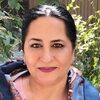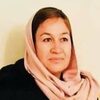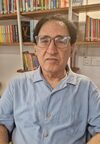In Cooperation with Simurgh Centre
Mushaira
The Mushaira is a special kind of literary performance. It is a cultural tradition in Afghanistan in which poets gather and take turns reciting their poems. The expressiveness, voice, melody and pitch of each poem are important elements, as is the individual way of reciting. Usually, a mushaira is accompanied by instrumental music of Afghan instruments such as robab, tola or tabla.
Mushairas played an important role in the promotion and development of literature, especially poetry. In the past, they were reserved for the royal courts, which changed in the 20th century. In the last 20 years, as more and more cultural events became established, mushairas were held every Friday in most cities in Afghanistan. The Goethe-Institut in Kabul also organised mushairas and gathered poets from different languages and regions of the country.
This important tradition is carried on by poets in exile. The special feature of the Mushaira at this festival is the live broadcast. It takes place in cooperation with the Simurgh Centre in New Delhi and thus connects Afghan poets in Berlin and New Delhi with each other.
Host:
 © Sohayla Ashgary
Sohayla Asghary
© Sohayla Ashgary
Sohayla Asghary, born in Afghanistan in 1963, studied journalism at Kabul University. She has worked as a television and radio journalist as well as a presenter at Radio and TV Afghanistan, as an editor, presenter and newsreader at Radio Moscow and as a broadcaster at Radio Free Europe in Prague. She currently works for Jugendhilfe Jetzt.
Gäste:
 © Alam Gul Sahar
Alam Gul Sahar
© Alam Gul Sahar
Alam Gul Sahar is a poet, writer and journalist born in 1963 in Paktia province, Afghanistan. He completed his higher education at the Faculty of Languages and Literature at Kabul University. He has worked in various Afghan government agencies as well as the BBC, Azadi Radio and Lemar TV. Most recently, he was the cultural attaché of the Afghan Embassy in Germany. Alam Gul Sahar has written 28 books in the fields of poetry, narrative literature, folklore, children's literature and history, of which 22 have been published.
 © Naeema Ghani
Naeema Ghani
© Naeema Ghani
Naeema Ghani is a writer, social activist, teacher and editor who was not allowed to go to school for many years. She moved to Kabul to study, where she began campaigning for the rights of women and girls in 2009. Despite family and social conflicts, Ghani did not let herself be diverted from her path. She became a member of the first literary circle of Pashtun women called "Mairman Adabi Baher", wrote and worked for women's rights and supported young Pashtun girls in writing. Ghani wrote articles for the BBC, King's College and Sarkhat. She published 17 of her own children's books, translated more than 50 children's books and founded the "Adabit kodak Afghanistan national foundation", which promotes children's literature and educational rights in Afghanistan. She has received awards from organisations and the Afghan government for her commitment.
 © Mariam Meetra
Mariam Meetra
© Mariam Meetra
Mariam Meetra is a poet and writer. She was born in Baghlan, Afghanistan in 1992 and now lives in Berlin. Meetra studied journalism and public relations in Kabul and completed a master's degree in social sciences at Humboldt University in Berlin. She currently works as a research assistant at the University of Leipzig and is a literary curator for Deutsche Welle and the Beethovenfest in Bonn. The writer and women's rights activist is a member of the Afghan PEN. In 2013, her first volume of poetry "Leben am Rand" was published in Persian. In German, she has published in the magazine "die horen", among others. "I have seen the wrath of the wind" is her first volume of poetry in German.
 © Abdul Wahab Mojeer
Abdul Wahab Mojeer
© Abdul Wahab Mojeer
Abdul Wahab Mojeer is a poet, writer, satirist and songwriter. He was born in 1975 in the city of Mazar-e-Sharif, Balkh province. Before the Taliban conquered Afghanistan, he worked in the Balkh provincial administration and came to Germany on 25 October 2021. He studied literature at Balkh University. Since then, he has been active in poetry and songwriting and has participated in many programmes and festivals in Afghanistan. Mojeer has published a total of 24 books in the fields of poetry, literature, music and literary criticism. He composed more than one hundred songs for singers. Mojeer is also a civil society and artistic activist. Today he lives in Bonn.
 © Sayeed Mohammad Reza Parwan
Sayeed Mohammad Reza Parwan
© Sayeed Mohammad Reza Parwan
Sayeed Mohammad Reza Parwan was born in 1963 in Kabul, in Jamal Mina, Karte Sakhi. He went to Mahmud Tarzi High School and then graduated from law school. He was the national bus commander in Ghazni province before immigrating to India in August 2018.
 © Shafiqa Ahmadi Maryam
Shafiqa Ahmadi Maryam
© Shafiqa Ahmadi Maryam
Shafiqa Ahmadi Maryam is 24 years old, a refugee, and a writer and a poet. Even during her very early years, Shafiqa was the narrator of bitter and sweet stories from the streets of Kabul. She dreamt and had written a thousand dreams of her generation. She now writes for her happiness, and for the happiness of people around her. She writes about everything in a day full of life and motion - from observing a girl in the metro every morning, to a cup of coffee - in the big city of Delhi. She writes neither to the future or the past, but to the present.
Music:
 © Asia Mehrabi
Asia Mehrabi
© Asia Mehrabi
Asia Mehrabi (vocals) wrote poems and articles about Afghan literature and society after graduating from high school in Kabul. She moved to Cologne in November 2000. Since 2012, Mehrabi has participated in Afghan literary and cultural events in Germany and other European countries. Since 2018, she has been singing the poems of Afghan women. In Cologne, she attended school again and after graduating from school in 2009, she worked at various social institutions with children and young people in need of inclusion. She currently works at the Graf Recke Foundation.
 © Asad Qasmi
Asad Qasmi
© Asad Qasmi
Asad Qasmi is an Afghan singer and rabab player. He has been playing the rabab for 13 years, having learnt it from two prominent ustads in Afghanistan. He and his brother, Rohullah, who usually accompanies him on the table, have been living in India for almost seven years.
Back